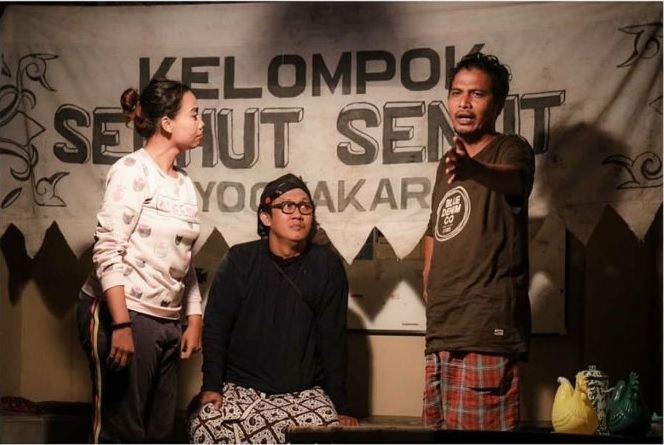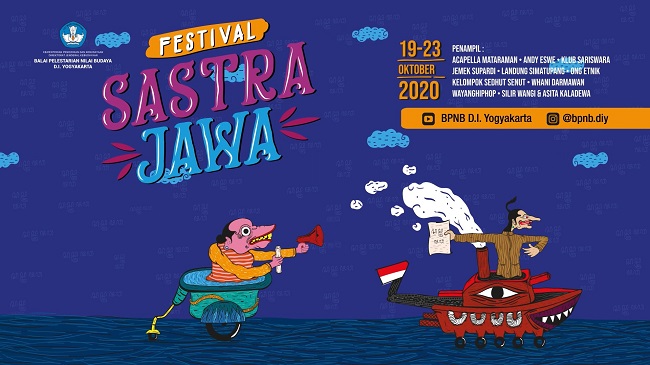Taking their performance online opened up new avenues for expression and collaboration for the Sedhut Senut theatre group
Versi Bh. Indonesia
Elyandra Widharta
Sendut Senut is a theatre group originally called Komunitas Sego Gurih, literally ‘Delicious Rice Community’ which performs Javanese language plays. Formed in 1998 at the SMKI (Javanese Music High School) in Yogyakarta, at first its members were predominantly students at this school. This community often staged plays at wedding celebrations, at Independence Day performances in local neighbourhoods or on the edge of rice fields.
When we heard that all theatre performances had to be cancelled because of the pandemic we were shocked, alarmed, with no idea what to do. But then we had the opportunity to present several performances online, sponsored by the Yogyakarta provincial government. In preparing for these shows we learnt a great deal about acting in front of the camera. And through this experience we realised that digital technology wasn't something to be feared, avoided. Rather it could be understood and worked on together so that we could continue to perform theatre that fosters and sustains Javanese language and culture.
The name Komunitas Sego Gurih arose spontaneously. Wage Daksina, one of the founders of the community, explained that sego gurih, a very simple rice dish, suggests that rice without vegetables or other side dishes can still be delicious. Metaphorically it indicates that even if there is no lamp to illuminate a performance it can still go ahead. We chose to perform in Javanese, both as our mother tongue and as a language which is very effective in commenting on politics, society and culture. Today we still maintain the same spirit, performing in villages and lower-class neighbourhoods, and using Javanese language. For us Javanese is a medium of communication which brings us close to the people. The simple aim of our group is that people should continue to love Javanese language and culture.
The plays performed by the group are indeed stories of everyday life. Portraits of domestic issues such as relations between husband and wife, local education and government regulations, situations which are often absurd and paradoxical. The style of Javanese we use is heard everywhere as a medium of communication in everyday interactions. Our plays cause audience members to laugh because what they are seeing on the stage seems like part of their own life experience.

Komununitas Sego Gurih ceased performing in 2003, but in 2009 activities revived again. The group now performs using a new name, Sedhut Senut. The meaning of the name is not important; the key thing is that it’s easy to remember.
A new era
At the beginning of March 2020, I was preparing a performance together with the group. The first rehearsal went ahead, we had a short discussion and made up a schedule for further rehearsals. But then came the COVID-19 epidemic which spread throughout Indonesia, including Yogyakarta. Everyone panicked, felt confused and helpless because almost all performance activities had to cease immediately. There was even an instruction from the government not to hold any kind of event where people could gather together.
Our rehearsals and planned performance had to be cancelled! Many of my friends in Sedhut Senut were very disappointed, but what could they do? They had to remain safe and obey the instructions of the government. Nothing was clear, months passed, May, June even July. These conditions naturally had a huge impact on us as theatre practitioners; personally, I was very confused at the beginning of the COVID-19 epidemic. None of my arts activities were happening, even to meet with friends from Sedhut Senut I had to chat with them via zoom, and then only at night. We exchanged news, found out about conditions in areas where our friends lived, whether it was still safe or in lockdown. The pandemic rendered our group totally passive with no activities. Conditions became more and more uncertain. I was struggling to survive economically, like other members of Sedhut Senut who also had to just stay at home. These were conditions we had never faced before. What could we do to recover our creativity?
In June I received the good news that our proposal for an online performance had been accepted by one of the departments of the provincial government of Yogyakarta. So, with Sedhut Senut I produced a Javanese-language play performed online entitled ‘Tarub’. Tarub tells a story which takes place in a village where a couple are planning to get married. But because of a miscommunication between the village head and the people involved the plans are cancelled. A conflict stemming from the difference between the words ‘tarub’ (meaning a temporary structure erected for a wedding celebration) and ‘tayub’, a sexy dance show, is the cause of the problem.
The play script was written just in outline form, without fixed dialogue. As usual we began rehearsing with a general discussion about the play, then improvised with no interruptions from the director calling out ‘Cut!’. We recorded the rehearsal on a mobile phone so that we could review the scenes we’d improvised one by one.
We used this model for subsequent rehearsals with the actors playing other roles in the play. Eventually we agreed to meet every Sunday to rehearse, recording the scenes on camera and also making ‘stock shots’. Acting in front of the camera was certainly difficult for us as we didn't use a film editing model. So each time a mistake occurred or there was too long a pause in the dialogue the whole scene had to be recorded again. Often we had to record a single scene five or six times. While this was happening it was very important for the actors to maintain an upbeat mood, to give one another positive energy.
On 19 August, our performance was presented on the YouTube channel of the Department of Culture, together with other programs facilitated by the government. From this experience of creating a performance online we got the idea of developing it into a serial which could be broadcast in separate episodes. Throughout September we filmed scenes which would later put together into a story with a different title. The title was chosen after the editing process was completed. Clearly this creativity resulted from the self-actualisation we experienced by working with digital media.
Another opportunity arose in October when Sedhut Senut was invited to stage a livestreamed performance to celebrate the anniversary of the founding of Yogyakarta. The play presented a short history of the city from the signing of the treaty of Giyanti to the time the royal palace was moved to Yogyakarta from Amberketawang. The play also highlighted the declaration of 5 September 1945 in which Yogyakarta affirmed its wish to become part of the unitary state of the Republic of Indonesia.
As the medium of the stage was replaced by digital technology this meant learning new techniques and through this process my Sedhut Senut friends and I experienced self-actualisation. We realised that digital technology was not something to be feared and avoided, but rather understood and embraced so that we could adjust to the aesthetic requirements of this new form of expression.
This is the experience I can share of the time of COVID-19 in Yogyakarta. Hopefully this might be something to learn from and reflect upon for myself and other performers of theatre grounded in the everyday life of the people.
Elyandra Widharta (widhartaelyandra@gmail.com) is an actor and playwright with the theatre group Sedhut Senut.
